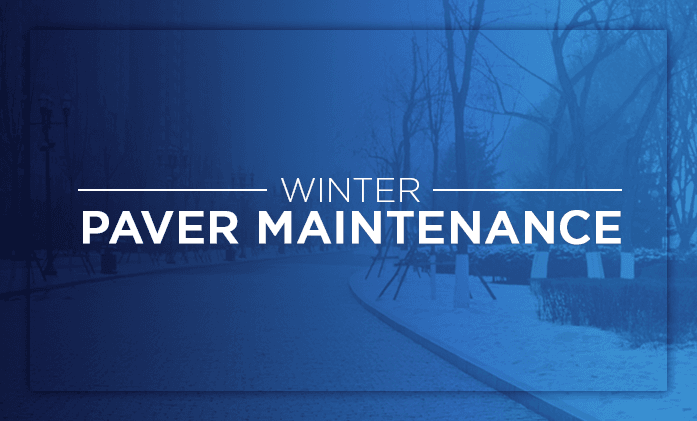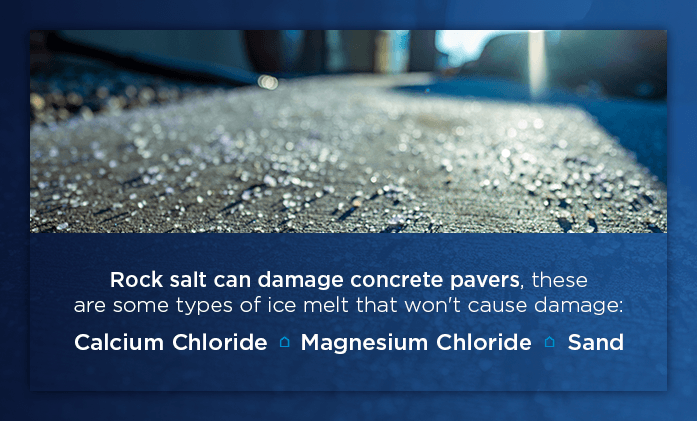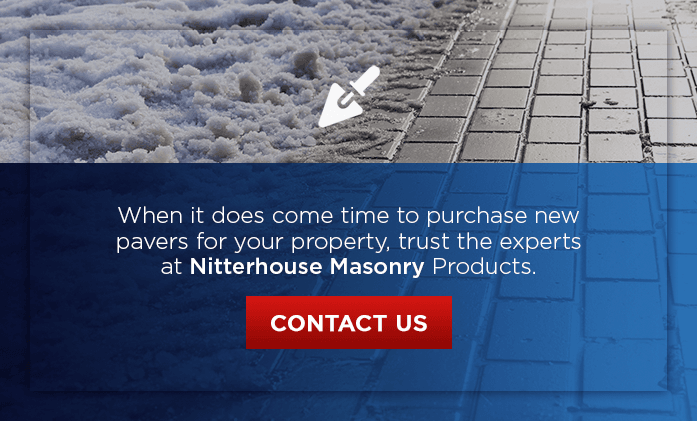
Jump To:
- What Causes Damage to Pavers in the Winter?
- What Types of Ice Melt Can You Use on Pavers?
- How to Protect Your Concrete Pavers
- Purchase New Pavers From Nitterhouse Masonry
Anyone who lives in an area that gets cold winter weather knows icy conditions can make navigating concrete surfaces a dangerous process. Both concrete pavers and sidewalks can quickly turn into a slip-and-fall risk when coated in snow and ice.
While winter weather makes it treacherous to walk on concrete sideways and concrete pavers. The surfaces themselves also suffer damage such as cracks, splits and crumbling after a heavy winter. For people who may have pavers or sidewalks on their property, combating slippery ice while preventing further damage can be tricky.
In this article, we’ll look at the main causes of damage to pavers in the winter, how salt treatment affects pavers and how to protect your pavers from slippery conditions and damage in the future.
What Causes Damage to Pavers in the Winter?
If you have a concrete sidewalk or pavers on your property, you’ve likely experienced them cracking, splitting or crumbling after a long winter. But what exactly causes this damage to concrete pavers?
The main source of damage to most concrete patio pavers and sidewalks is water. When the weather turns cold, water will freeze, which causes expansion on the surface of your pavers. As water begins to melt, it contracts back into a liquid form. This constant expansion and contraction — or growing and shrinking — will lead to cracks over time if you don’t take preventative measures and practice routine maintenance.
Does Salt Damage Concrete Pavers?
One of the most common solutions that property owners use to de-ice their pavers is rock salt. Typical on winter roadways and sidewalks, salt rapidly melts ice due to its lower freezing point than pure water.
However, rock salt can damage concrete pavers, as it’s made up of moisture that absorbs into pavers and can refreeze at a later point. As winter progresses, the moisture from the salt will continue to freeze, melt and refreeze with each temperature change. Additionally, salt can be abrasive and corrosive, causing damage to the surface of your pavers if applied steadily over a period of time.
While salt does work to melt snow and ice, it can also cause damage to your pavers, so consider other methods to melt winter snow instead.
What Types of Ice Melt Can You Use on Pavers?
While rock salt may not be the best option to use on your pavers, there are plenty of other types of ice melt that won’t cause damage. If you’re curious about what kind of salt doesn’t damage concrete, you’ll want to think about picking up one of the following products:
Calcium Chloride
This is a fast-acting salt product that aims to melt snow and ice while simultaneously resisting freezing down to 25 degrees Fahrenheit. Available in the form of pellets, you can sprinkle calcium chloride onto pavers just as you would rock salt but without risking damaging the surface due to melting and refreezing.
Magnesium Chloride
Similar to calcium chloride, magnesium chloride is a highly rated product that’s efficient in its ability to melt ice without damaging the surface of your pavers. While more expensive than rock salt, you may save money as you won’t have to replace your pavers from rock salt damage.
Sand
The most affordable way to melt ice and snow on pavers is by sprinkling sand on top of the afflicted area. While sand won’t harm your pavers, you should consider the potential post-winter cleanup, as sand doesn’t go away like calcium or magnesium chloride. Once you’re done using it, you’ll have to blow or sweep it away.
How to Protect Your Concrete Pavers
While responding to cold weather and icy conditions in the proper way is a good combatant to cracking pavers, it’s essential to utilize prevention methods, as well. Here are a few ways to preemptively care for your concrete pavers ahead of the winter season.
1. Choose the Right Material
While cold weather may be the number one reason for cracked pavers, the pavers’ material makes a significant difference in their overall lifespan. Most pavers are made from durable materials, but they can range in quality.
2. Ensure Your Pavers Are Installed Properly
Installing pavers incorrectly can lead to permanent foundational issues in the pavers such as cracking, crumbling and chipping. One of the most common ways pavers are substandardly installed is by not packing down the base beneath them. If pavers are simply placed on an uneven surface, their chances of cracking are tremendously higher.
3. Use Pavement Sealer
If your pavers have been installed correctly, the next step is to seal your pavers to protect them from the damage caused by the environment around them. Elements such as wind, rain, ice, snow and ultraviolet rays from the sun can cause damage to your pavers over time. A sealer aims to prevent deep moisture penetration and protection from the weather.
4. Keep the Area Clean
As snow, ice and winter weather moves in, it’s essential to clean your pavers throughout the winter to ensure that they remain damage-free. If you have a precipitation-free day that’s above freezing, sweeping away excess sand, salt and other debris can keep your pavers from getting stained or overly messy.
By working to protect your concrete pavers, using the right types of ice melt and regularly cleaning your pavers, you can have a head start on ensuring your pavers last as long as possible.
Purchase New Pavers From Nitterhouse Masonry
When it does come time to purchase new pavers for your property, trust the experts at Nitterhouse Masonry Products. Nitterhouse Masonry serves customers with a range of paver products, allowing us to be the go-to source for contractors, construction companies and homeowners in the Chambersburg, Pennsylvania, region.
For questions about products and services or to purchase our quality pavers and paver products, contact us today!




